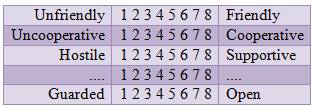Trait and situation theory

Situational leadership theory presumes that different styles of leadership will be better in different situations. This implies that leaders need to be flexible enough to adapt their leadership to changing situations.
Trait theory, on the other hand, argues that some individuals are born with traits (personal characteristics) that make them natural leaders. However, these traits will vary from person to person and there is no one particular trait, which on its own, will make a successful leader.
In Leadership in Organisations (1997), Gary Yuki suggests that successful leaders need to have the following traits:
- dominance (the desire to influence and lead others)
- adaptability - able to adapt to different situations easily
- energetic
- persistence - the will to carry things through and complete them
- assertiveness - the ability to assert your will onto others
- reliability and dependability
- ambition
- self-confident and tolerant to high levels of stress
Other leadership writers have their own list of necessary traits. The question is whether these traits are innate or learnt. Warren Bennis argues that the 'born leader' concept is a myth and that leadership skills need to be learned and practised in the same way as any other human skill.
Contingency approach to leadership (Fred Fiedler 1967)
All of the leadership styles identified so far have both strengths and weaknesses. In practice, good managers will vary their style in response to different situations in which they find themselves (Situational Leadership). Good leaders, therefore, are flexible and recognise that no one style can be effective all of the time, even if it has proved to be so in the past.
Fiedler is credited with helping move researchers from concentrating on the traits and personal characteristics of leaders to studying leadership styles and behaviours. Fiedler based his work on observations of leaders in a variety of situations and his analysis of the factors that determined, or contributed to, the success or otherwise of a particular style or approach. Therefore, appropriate leadership style in any situation is dependent, or contingent upon elements unique to that situation.
Fiedler suggested that the appropriate leadership style is contingent upon three main factors:
- The characteristics of the leader - whether they are predominantly relationship-driven or task-driven
- The situation - the nature of the task such as its difficulty and changeability
- The nature of the subordinates - the authority the leader has over them and the level of mutual respect that exists
Fiedler measured leadership style using his 'least preferred co-worker' (LPC) scale, The LPC scale asks a leader to think of all the people with whom they have ever worked and then to describe the person with whom they have worked least well, by reference to a series of bipolar scales of 1 to 8, such as the following:

A high LPC score suggests that the leader has a human relations orientation, while a low LPC score indicates a task orientation. Leaders, who are relationship motivated, tend to describe their least preferred co-workers in a more positive manner. Therefore, they receive higher LPC scores.
This approach may be clearer if you think about your school situation and the leadership style of teachers. When you are young, teachers may appear quite strict and task-oriented. They tend to give more orders and spend more time controlling your behaviour and outlining the task. When the same teacher teaches you for IB, their style is likely to be very different. They know you are willing to learn and are motivated to do so and can be more relationship-oriented. You are now more experienced and need less direction. The style is more relaxed and less directive. Your views are normally requested. The fact that senior classes tend to be smaller in number will also affect the dynamics of the group and the consequent leadership style.
One weakness of Fiedler's approach is that it ignores other factors that influence leadership effectiveness, such as the experience and personality traits of the leader. It is important to remember that individuals cannot always change their natural personality or characteristics. Therefore, even at IB level, some teachers will be more autocratic and some more democratic.